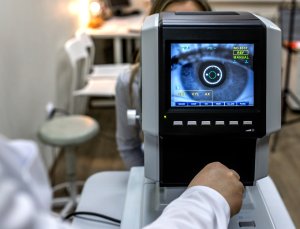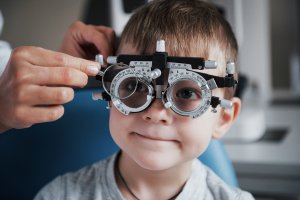What is Macular Degeneration?

Voted Best of Berks—
eight years in a row!
Macular degeneration is a leading cause of vision loss in older adults. It impacts the central part of the retina, which is responsible for detailed vision. At Eye Consultants of Pennsylvania, we understand the profound effects this condition can have on daily life. Our experienced team offers comprehensive care for age-related macular degeneration (AMD) using advanced diagnostic tools and personalized treatment plans.
Types and Risk Factors of AMD
Macular degeneration is a progressive eye disease that damages the macula, the central part of the retina responsible for high-resolution vision needed for activities like reading, driving, and recognizing faces. While peripheral vision usually remains intact, central vision can deteriorate significantly, impacting daily life and independence.
There are two types of age-related macular degeneration:
1. Dry AMD: This type accounts for 80-90% of cases. It occurs when the macula thins over time as part of aging, gradually accumulating drusen, tiny yellow deposits under the retina.
- Symptoms: Early symptoms may include blurred or distorted vision, difficulty seeing in low light, and the need for brighter lighting for close-up tasks. As it progresses, central vision can become increasingly blurry, creating a blind spot in the center of the visual field.
- Progression: Dry AMD typically progresses slowly, but in some cases, it can develop into the more severe wet AMD.
2. Wet AMD: This less common but more aggressive form of AMD occurs when abnormal blood vessels grow beneath the retina and macula. These vessels can leak fluid or blood, causing rapid damage to the macula.
- Symptoms: Symptoms often appear suddenly and include rapid loss of central vision, dark spots in the field of vision, and visual distortions, such as straight lines appearing wavy.
- Progression: Wet AMD can lead to significant and irreversible vision loss if not treated promptly.
Risk factors for macular degeneration include:
- Risk increases significantly after the age of 50.
- Genetic predisposition can increase the likelihood of developing AMD.
- Smoking doubles the risk of developing AMD.
- Poor diet, obesity, and lack of exercise are contributing factors.
- Conditions like high blood pressure and high cholesterol are associated with a higher risk.
Diagnosis and Management
Regular eye exams are crucial for early detection of macular degeneration, especially for those with risk factors. Early intervention can help preserve vision and maintain quality of life. At Eye Consultants of Pennsylvania, comprehensive eye exams include advanced diagnostic techniques such as visual acuity tests, retinal imaging, and optical coherence tomography (OCT). These tests allow our specialists to detect and monitor the progression of AMD.
While there is no cure for macular degeneration, early detection and treatment can manage symptoms and slow progression. Treatment options include:
- Nutritional Supplements: Supplements like vitamins C and E, zinc, copper, and lutein can help slow the progression of dry AMD. Our specialists recommend a personalized supplement regimen based on the AREDS2 formula to support retinal health.
- Anti-VEGF Injections: For wet AMD, anti-VEGF (vascular endothelial growth factor) injections help reduce abnormal blood vessel growth and leakage in the retina. This treatment can significantly slow vision loss and, in some cases, improve vision by targeting and inhibiting the proteins responsible for abnormal blood vessel formation.
Maintain Your Health and Independence
Managing macular degeneration requires early detection and specialized care. With a commitment to expertise and patient education, Eye Consultants of Pennsylvania strives to support you in maintaining the best possible vision and independence. If you or a loved one is at risk for macular degeneration, schedule an appointment today to explore how we can help protect your sight.
Find a Doctor
Physician information including education, training, practice location and more.
Schedule an Appointment
Call 800-762-7132 or make an appointment online.





